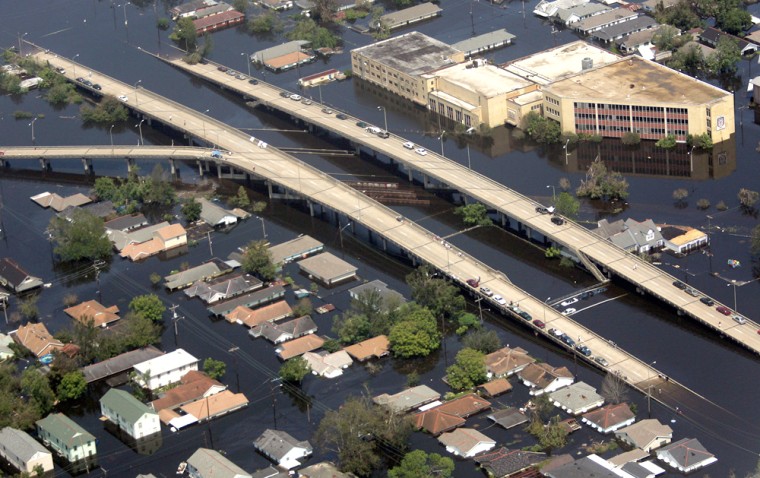The era of big government is back. President Bush is presiding over what is sure to be the most expensive government relief and reconstruction operation in U.S. history.
With estimates of the federal tab ranging up to $200 billion for rebuilding New Orleans and other storm-ravaged Gulf Coast cities, Bush and his Republican allies in Congress are casting aside budget discipline.
They’re also deferring — for now — vows to finish the Reagan revolution against big government and turning to some of the same kinds of public health, housing and job assistance programs they once criticized as legacies of the Democrats’ New Deal and Great Society.
Hurricane Katrina also opened the floodgates to proposals in Congress building on a host of long-cherished Republican themes. These include proposals for school vouchers for storm-displaced children, more federal support for “faith-based” organizations engaged in hurricane relief, as well as business-friendly “enterprise zone” tax credits for enterprises that rebuild in stricken areas and eased environmental and labor-protection requirements.
Deficit spending necessary
“The fact of the matter is when our nation faces these type of emergencies, it unfortunately requires us to deficit spend. It’s nothing that anybody in Washington, or anywhere for that matter, likes to do but it’s necessary,” White House counselor Dan Bartlett said ahead of Bush’s Thursday night speech to the nation.
Some fiscal conservatives are expressing alarm.
“It is inexcusable for the White House and Congress to not even make the effort to find at least some offsets to this new spending,” said Sen. Tom Coburn, R-Okla. “No one in America believes the federal government is operating at peak efficiency and can’t tighten its belt.”
Government failures at the federal, state and local levels are being widely blamed for the anarchy and loss of life in the early days after Katrina slammed into the Gulf Coast on Aug. 29.
“Yet now everybody says government is the answer. It’s baffling,” said Ronald D. Utt, who studies federal public works spending for the conservative Heritage Foundation.
The foundation has proposed that Congress reopen the $286.4 billion transportation bill enacted in July to remove some $25 billion in what it deems questionable projects, including a proposed $230 million bridge in Alaska from Ketchikan to an island with 50 residents.
So far, Congress has sped through bills providing $62.3 billion for Katrina relief — and made it clear these are just first installments.
‘Victims need more’
“That’s a good start, but victims need more,” Senate Minority Leader Harry Reid, D-Nev., said as Democrats worked to ensure they weren’t left on the sidelines in the rush by the GOP-led Congress to open the government’s wallets to storm victims.
Government spending on Katrina has already dwarfed the $15.5 billion total from all levels of government spent on the 1994 Los Angeles earthquake, $14 billion spent on last year’s Florida hurricanes and $10.8 billion spent on Hurricane Andrew in 1992.
Sen. Edward M. Kennedy, D-Mass., proposed that Congress create a Gulf Coast Redevelopment Authority, modeled after the Tennessee Valley Authority, to oversee the reconstruction. TVA, created during the Depression as an independent federal agency, is widely credited with the revitalization of the seven-state Tennessee Valley region.
Other lawmakers have called for a domestic version of the Marshall Plan that helped revive Europe after World War II, or something akin to President Franklin D. Roosevelt’s Work Projects Administration, which put millions of unemployed people to work — mainly on road, bridge and dam projects — during the Great Depression of the 1930s.
400,000 jobs lost in hurricane
Robert Reich, who was labor secretary in the Clinton administration, said the storm is unusual in that so many people “were forced from their homes and are out of work.” The Congressional Budget Office has estimated 400,000 jobs were lost in the hurricane. Some independent estimates are far higher.
“Almost a third of these people were below the poverty line,” said Reich, now a professor of economic and social policy at Brandeis University. He said any reconstruction plan “would have to include a broad-based plan to revive business, industries and jobs.”
Talk about a massive new federal role in hurricane relief and reconstruction is already raising alarms among some state and local officials, who want to retain the say in rebuilding decisions — a prerogative Bush thus far seems inclined to give them.
“I don’t want anyone outside of New Orleans telling us how to plan this city,” said New Orleans Mayor Ray Nagin, who announced Thursday that large parts of the city will open next week and the storied French Quarter the week after that.
“To anyone who even suggests that this great city should not be rebuilt, hear this and hear it well: We will rebuild,” Louisiana Gov. Kathleen Blanco told a meeting of state lawmakers in Baton Rouge on Wednesday evening.
